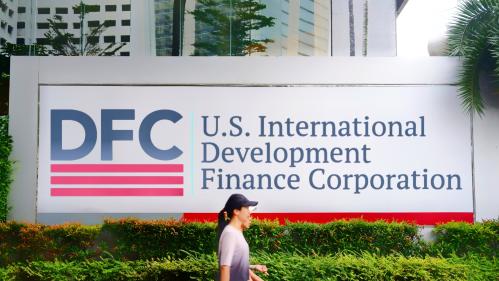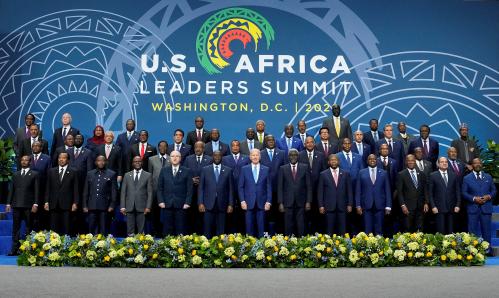Content from the Brookings Doha Center is now archived. In September 2021, after 14 years of impactful partnership, Brookings and the Brookings Doha Center announced that they were ending their affiliation. The Brookings Doha Center is now the Middle East Council on Global Affairs, a separate public policy institution based in Qatar.
For too long, governments of the Middle East and outside actors have operated in short-term crisis mode, presenting piecemeal policies which fail to tackle the cycles of instability and violence in the region. There is a clear and present need to confront the cross-border issues facing the Middle East with a strategy that takes a regional, rather than country-by-country, view. The Kingdom of Jordan, wedged between the Gulf monarchies, the ongoing Israeli-Palestinian conflict, and escalating twin crises in Syria and Iraq, can and must be the cornerstone of such a strategy.
For over three years, Jordan has lived with armed conflict effectively on its doorstep, as Syria has descended into a violent civil war. Thus far, the Kingdom has remained a relative oasis of stability in a troubled region, managing to host hundreds of thousands of Syria refugees who have streamed across the border while still attracting tourists from neighboring Gulf countries and further afield in large numbers.
Despite repeated predictions of Jordan’s imminent demise, due to internal stresses and the tumultuous politics of the region, it has proven its resilience time and again. The Kingdom has consistently met its commitments according to the principles of international law, such as caring for and hosting large numbers of refugees, a stance generally rewarded with little more than international praise and less-than-sufficient aid funds. Yet as King Abdullah noted in a statement released last week, the international community must continue to find ways of supporting Jordan against the severe challenges it faces.
Today, though, a series of inter-connected factors risk tipping the country past its ‘breaking point’. Influxes of refugees have put considerable strain on Jordan’s already limited carrying capacity – today, over 50% of the Kingdom’s population holds refugee status. The Kingdom was already one of the most water-scarce countries in the world, with less than 145 cubic meters of water per capita annually, before the arrival of more than 600,000 Syrians fleeing the civil war. With the economy struggling and unemployment high, there are few jobs to go around for communities living on the economic margins.
More recently, the rapid advances of the jihadi group the Islamic State (IS) have raised the spectre of the organization turning its attention to Jordan, as the group threatens border crossings and appeals to groups inside the Kingdom. While the Kingdom’s security and armed forces have been effective thus far in guarding the country’s borders, they are far less capable of confronting internal threats to stability, as shown by recent pro-ISIS demonstrations deep within Jordanian territory, in the southern city of Ma’an.
Jordan’s internal grievances are many, from allegations of corruption to feelings of economic marginalization in tribal and rural areas. Limited reforms have garnered some acceptance among the population, but only to an extent – and then largely due to citizens’ fears that the country might suffer economic or political collapse without some measure of consensus. As recent demonstrations in Ma’an and elsewhere show, fear cannot provide a long-term antidote to the bitterness felt in many areas of the Kingdom.
It is time for Jordan’s friends to offer more than just rhetoric, arms, or short-sighted aid. A strategy focused entirely on national security – massing troops on the Jordan-Iraq border, for example – will not prevent a collapse of the Jordanian state from within. Nor can humanitarian aid or World Bank loans provide the economic growth and sustainability needed for Jordan to survive as a land of hope, moderation and stability.
Jordan needs friends who can provide targeted and productive investments, taking advantage of a highly educated population to achieve real economic growth. The country is already a recognized financial and commercial hub for the region, and is well-positioned to benefit from further investment in critical areas of energy and water alongside traditional economic sectors of trade, tourism, and transportation. Beyond this, specialized programs are needed to provide some measure of economic opportunity to new refugees, currently all but isolated from the mainstream economy. While corruption remains an ongoing concern, the Jordanian government can build on past reforms to ensure that economic development is coupled with greater transparency and judicial independence.
As a longstanding ally of Jordan, the United States can and should demonstrate global leadership in re-affirming a regional commitment to maintaining Jordan’s stability and security. Still, the present situation calls for a coalition of supporters, spearheaded by the Kingdom’s regional neighbors, especially Saudi Arabia and Egypt. While the U.S. expanded its financial assistance to the Kingdom in the wake of the Arab Spring, and the Gulf Cooperation Council toyed with the idea of extending an invitation to Jordan, the present situation requires a more coordinated response.
Further collaboration with other actors will be key. Even Israel can play a constructive role, moving beyond its purely military view of Jordanian stability to provide support on broader issues such as maintaining an adequate water supply or developing Jordan’s tourism potential, or even meeting its international obligations towards refugees in the region. Iran, too, might find a role, as it now faces a common enemy in ISIS.
Demonstrating that the international community and Jordan stand by a set of fundamental values would help stabilize the region. The cost of doing so is minimal compared with the far-reaching consequences of a failed Jordan.



Commentary
Op-edJordan on the Edge: A Broader Strategy for Security
July 14, 2014